Healthcare Service Delivery: A Reflective Analysis on Cultural Impact
VerifiedAdded on 2023/06/11
|11
|3896
|195
Report
AI Summary
This report provides a reflective analysis of how culture impacts healthcare service delivery, utilizing Gibbs' Reflective Cycle. It details an experience as a nursing staff member during the COVID-19 pandemic, where cultural beliefs hindered patient care. The reflection covers the description of the incident, the feelings experienced, evaluation of the situation, analysis of the cultural impact, and a conclusion on the negative effects on healthcare quality. The report also touches on strategies used to improve communication and build relationships with patients to overcome cultural barriers, and the importance of understanding and respecting cultural norms in healthcare settings. It concludes that while culture significantly impacts healthcare, improved communication skills and cultural sensitivity can lead to better patient outcomes. The document emphasizes the need for healthcare professionals to adapt their practices to accommodate diverse cultural beliefs while ensuring quality care.
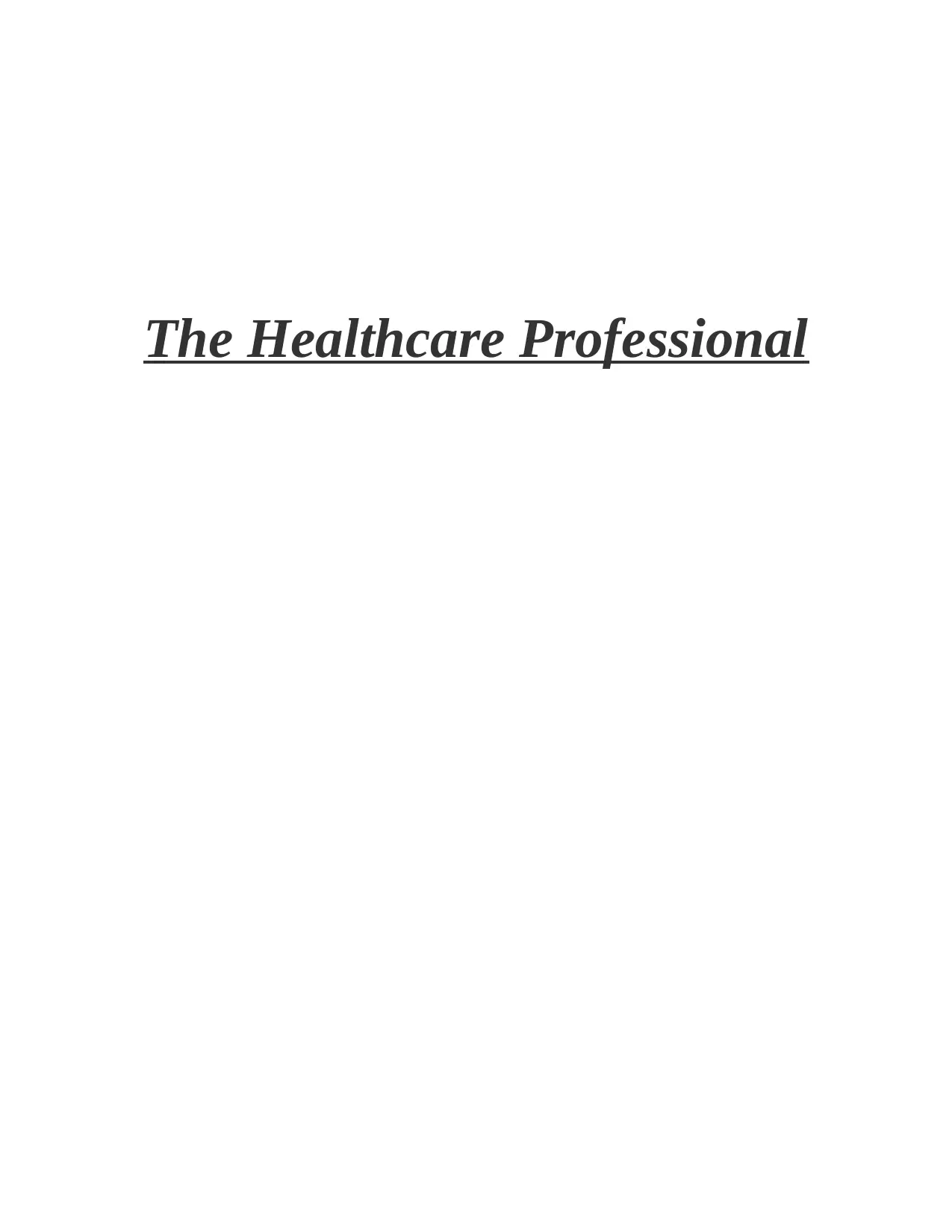
The Healthcare Professional
Paraphrase This Document
Need a fresh take? Get an instant paraphrase of this document with our AI Paraphraser
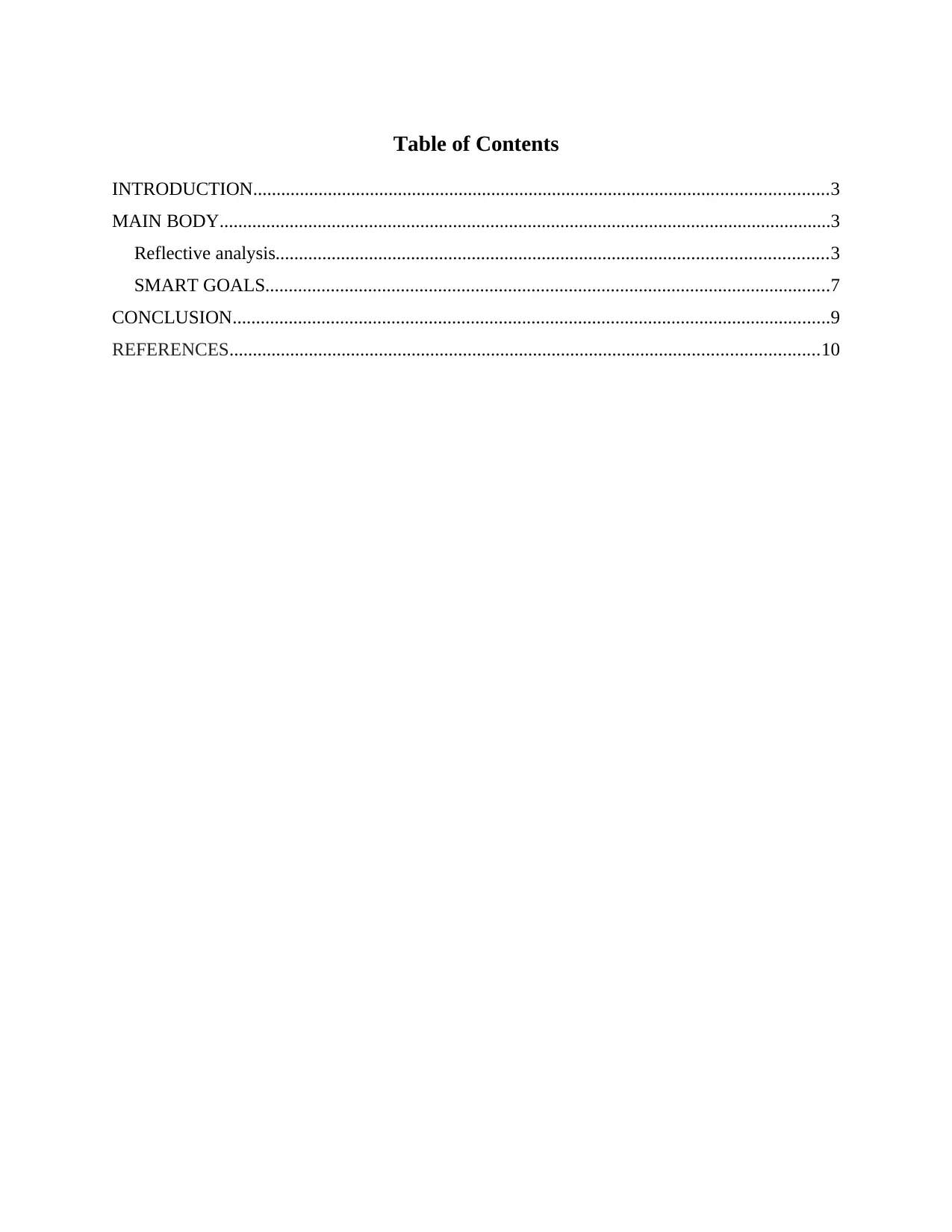
Table of Contents
INTRODUCTION...........................................................................................................................3
MAIN BODY...................................................................................................................................3
Reflective analysis......................................................................................................................3
SMART GOALS.........................................................................................................................7
CONCLUSION................................................................................................................................9
REFERENCES..............................................................................................................................10
INTRODUCTION...........................................................................................................................3
MAIN BODY...................................................................................................................................3
Reflective analysis......................................................................................................................3
SMART GOALS.........................................................................................................................7
CONCLUSION................................................................................................................................9
REFERENCES..............................................................................................................................10
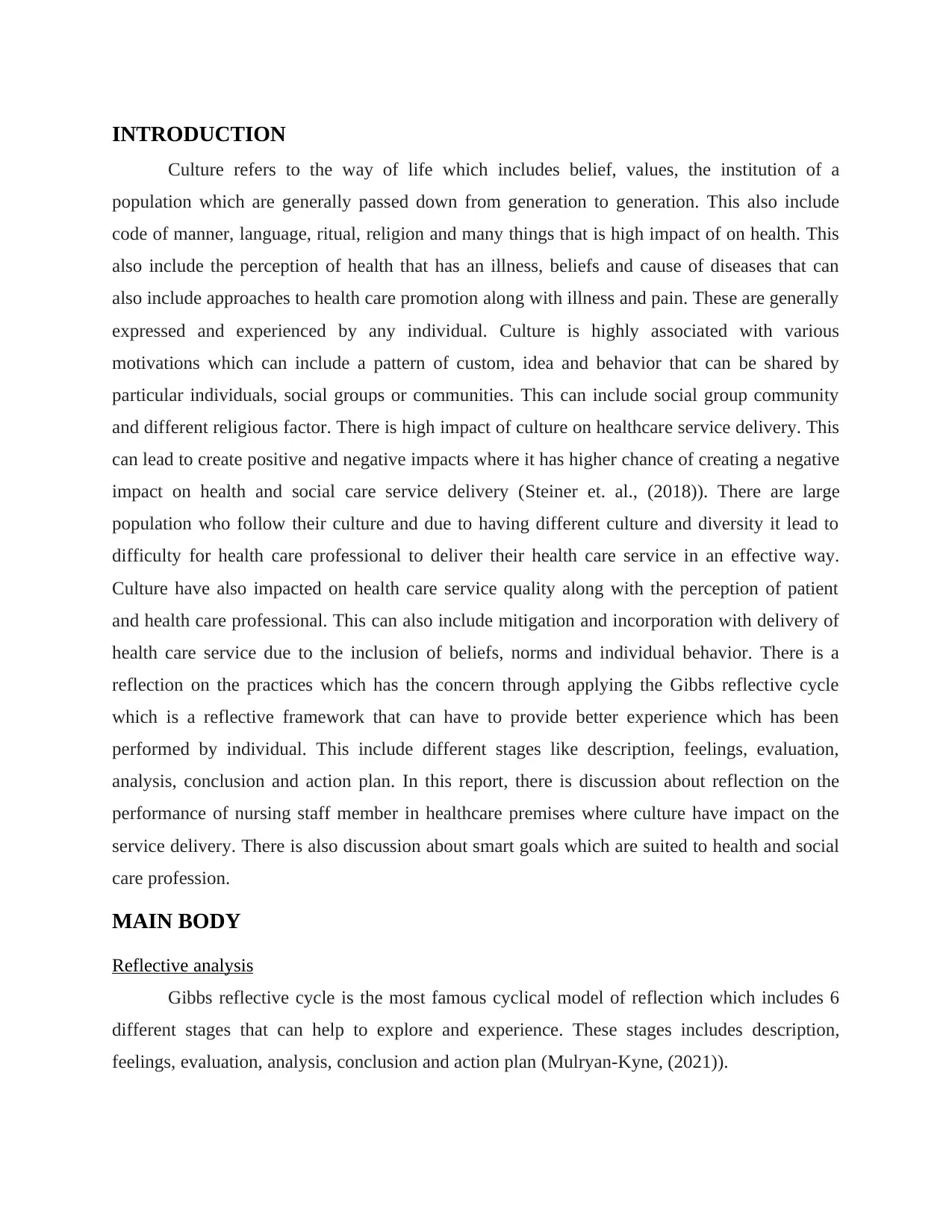
INTRODUCTION
Culture refers to the way of life which includes belief, values, the institution of a
population which are generally passed down from generation to generation. This also include
code of manner, language, ritual, religion and many things that is high impact of on health. This
also include the perception of health that has an illness, beliefs and cause of diseases that can
also include approaches to health care promotion along with illness and pain. These are generally
expressed and experienced by any individual. Culture is highly associated with various
motivations which can include a pattern of custom, idea and behavior that can be shared by
particular individuals, social groups or communities. This can include social group community
and different religious factor. There is high impact of culture on healthcare service delivery. This
can lead to create positive and negative impacts where it has higher chance of creating a negative
impact on health and social care service delivery (Steiner et. al., (2018)). There are large
population who follow their culture and due to having different culture and diversity it lead to
difficulty for health care professional to deliver their health care service in an effective way.
Culture have also impacted on health care service quality along with the perception of patient
and health care professional. This can also include mitigation and incorporation with delivery of
health care service due to the inclusion of beliefs, norms and individual behavior. There is a
reflection on the practices which has the concern through applying the Gibbs reflective cycle
which is a reflective framework that can have to provide better experience which has been
performed by individual. This include different stages like description, feelings, evaluation,
analysis, conclusion and action plan. In this report, there is discussion about reflection on the
performance of nursing staff member in healthcare premises where culture have impact on the
service delivery. There is also discussion about smart goals which are suited to health and social
care profession.
MAIN BODY
Reflective analysis
Gibbs reflective cycle is the most famous cyclical model of reflection which includes 6
different stages that can help to explore and experience. These stages includes description,
feelings, evaluation, analysis, conclusion and action plan (Mulryan-Kyne, (2021)).
Culture refers to the way of life which includes belief, values, the institution of a
population which are generally passed down from generation to generation. This also include
code of manner, language, ritual, religion and many things that is high impact of on health. This
also include the perception of health that has an illness, beliefs and cause of diseases that can
also include approaches to health care promotion along with illness and pain. These are generally
expressed and experienced by any individual. Culture is highly associated with various
motivations which can include a pattern of custom, idea and behavior that can be shared by
particular individuals, social groups or communities. This can include social group community
and different religious factor. There is high impact of culture on healthcare service delivery. This
can lead to create positive and negative impacts where it has higher chance of creating a negative
impact on health and social care service delivery (Steiner et. al., (2018)). There are large
population who follow their culture and due to having different culture and diversity it lead to
difficulty for health care professional to deliver their health care service in an effective way.
Culture have also impacted on health care service quality along with the perception of patient
and health care professional. This can also include mitigation and incorporation with delivery of
health care service due to the inclusion of beliefs, norms and individual behavior. There is a
reflection on the practices which has the concern through applying the Gibbs reflective cycle
which is a reflective framework that can have to provide better experience which has been
performed by individual. This include different stages like description, feelings, evaluation,
analysis, conclusion and action plan. In this report, there is discussion about reflection on the
performance of nursing staff member in healthcare premises where culture have impact on the
service delivery. There is also discussion about smart goals which are suited to health and social
care profession.
MAIN BODY
Reflective analysis
Gibbs reflective cycle is the most famous cyclical model of reflection which includes 6
different stages that can help to explore and experience. These stages includes description,
feelings, evaluation, analysis, conclusion and action plan (Mulryan-Kyne, (2021)).
⊘ This is a preview!⊘
Do you want full access?
Subscribe today to unlock all pages.

Trusted by 1+ million students worldwide
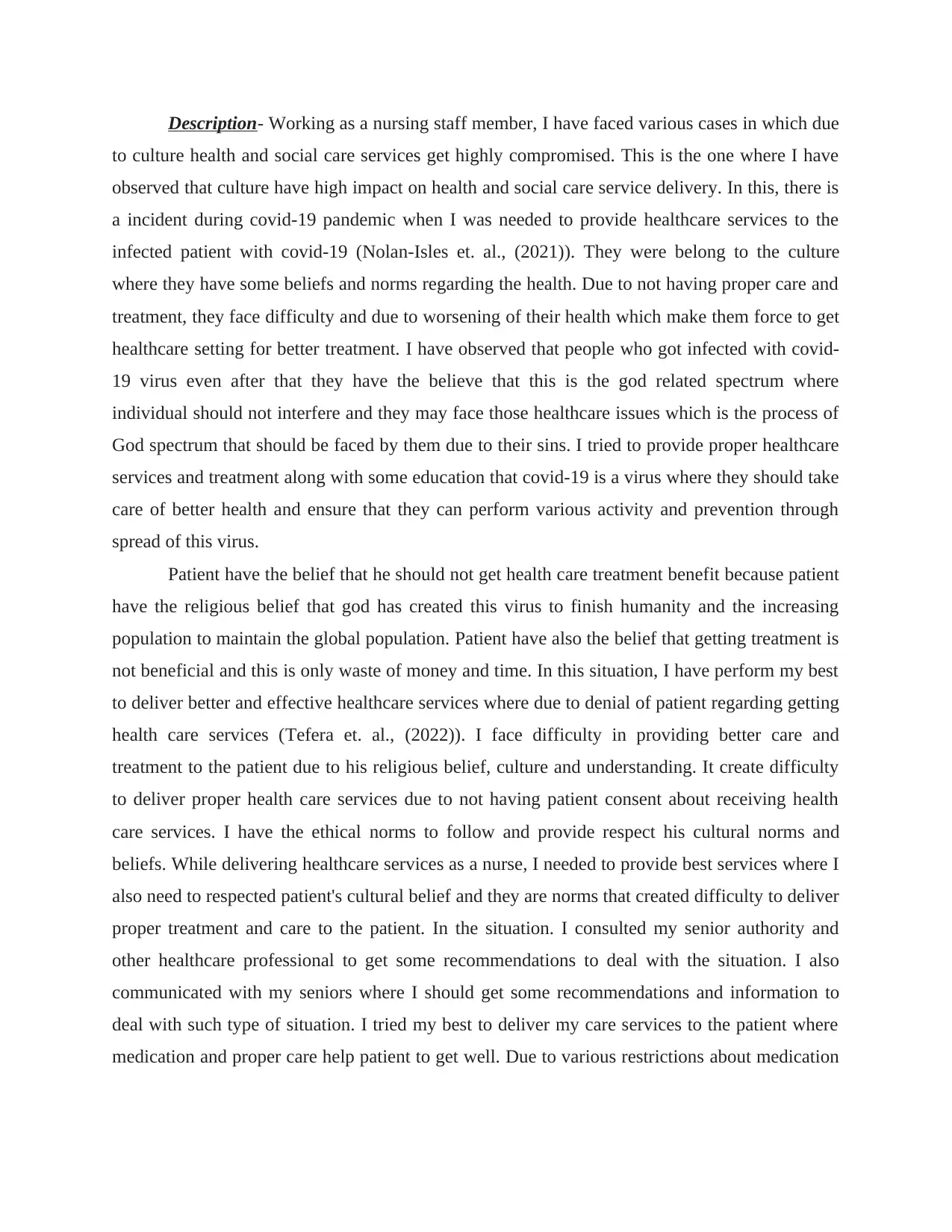
Description- Working as a nursing staff member, I have faced various cases in which due
to culture health and social care services get highly compromised. This is the one where I have
observed that culture have high impact on health and social care service delivery. In this, there is
a incident during covid-19 pandemic when I was needed to provide healthcare services to the
infected patient with covid-19 (Nolan-Isles et. al., (2021)). They were belong to the culture
where they have some beliefs and norms regarding the health. Due to not having proper care and
treatment, they face difficulty and due to worsening of their health which make them force to get
healthcare setting for better treatment. I have observed that people who got infected with covid-
19 virus even after that they have the believe that this is the god related spectrum where
individual should not interfere and they may face those healthcare issues which is the process of
God spectrum that should be faced by them due to their sins. I tried to provide proper healthcare
services and treatment along with some education that covid-19 is a virus where they should take
care of better health and ensure that they can perform various activity and prevention through
spread of this virus.
Patient have the belief that he should not get health care treatment benefit because patient
have the religious belief that god has created this virus to finish humanity and the increasing
population to maintain the global population. Patient have also the belief that getting treatment is
not beneficial and this is only waste of money and time. In this situation, I have perform my best
to deliver better and effective healthcare services where due to denial of patient regarding getting
health care services (Tefera et. al., (2022)). I face difficulty in providing better care and
treatment to the patient due to his religious belief, culture and understanding. It create difficulty
to deliver proper health care services due to not having patient consent about receiving health
care services. I have the ethical norms to follow and provide respect his cultural norms and
beliefs. While delivering healthcare services as a nurse, I needed to provide best services where I
also need to respected patient's cultural belief and they are norms that created difficulty to deliver
proper treatment and care to the patient. In the situation. I consulted my senior authority and
other healthcare professional to get some recommendations to deal with the situation. I also
communicated with my seniors where I should get some recommendations and information to
deal with such type of situation. I tried my best to deliver my care services to the patient where
medication and proper care help patient to get well. Due to various restrictions about medication
to culture health and social care services get highly compromised. This is the one where I have
observed that culture have high impact on health and social care service delivery. In this, there is
a incident during covid-19 pandemic when I was needed to provide healthcare services to the
infected patient with covid-19 (Nolan-Isles et. al., (2021)). They were belong to the culture
where they have some beliefs and norms regarding the health. Due to not having proper care and
treatment, they face difficulty and due to worsening of their health which make them force to get
healthcare setting for better treatment. I have observed that people who got infected with covid-
19 virus even after that they have the believe that this is the god related spectrum where
individual should not interfere and they may face those healthcare issues which is the process of
God spectrum that should be faced by them due to their sins. I tried to provide proper healthcare
services and treatment along with some education that covid-19 is a virus where they should take
care of better health and ensure that they can perform various activity and prevention through
spread of this virus.
Patient have the belief that he should not get health care treatment benefit because patient
have the religious belief that god has created this virus to finish humanity and the increasing
population to maintain the global population. Patient have also the belief that getting treatment is
not beneficial and this is only waste of money and time. In this situation, I have perform my best
to deliver better and effective healthcare services where due to denial of patient regarding getting
health care services (Tefera et. al., (2022)). I face difficulty in providing better care and
treatment to the patient due to his religious belief, culture and understanding. It create difficulty
to deliver proper health care services due to not having patient consent about receiving health
care services. I have the ethical norms to follow and provide respect his cultural norms and
beliefs. While delivering healthcare services as a nurse, I needed to provide best services where I
also need to respected patient's cultural belief and they are norms that created difficulty to deliver
proper treatment and care to the patient. In the situation. I consulted my senior authority and
other healthcare professional to get some recommendations to deal with the situation. I also
communicated with my seniors where I should get some recommendations and information to
deal with such type of situation. I tried my best to deliver my care services to the patient where
medication and proper care help patient to get well. Due to various restrictions about medication
Paraphrase This Document
Need a fresh take? Get an instant paraphrase of this document with our AI Paraphraser
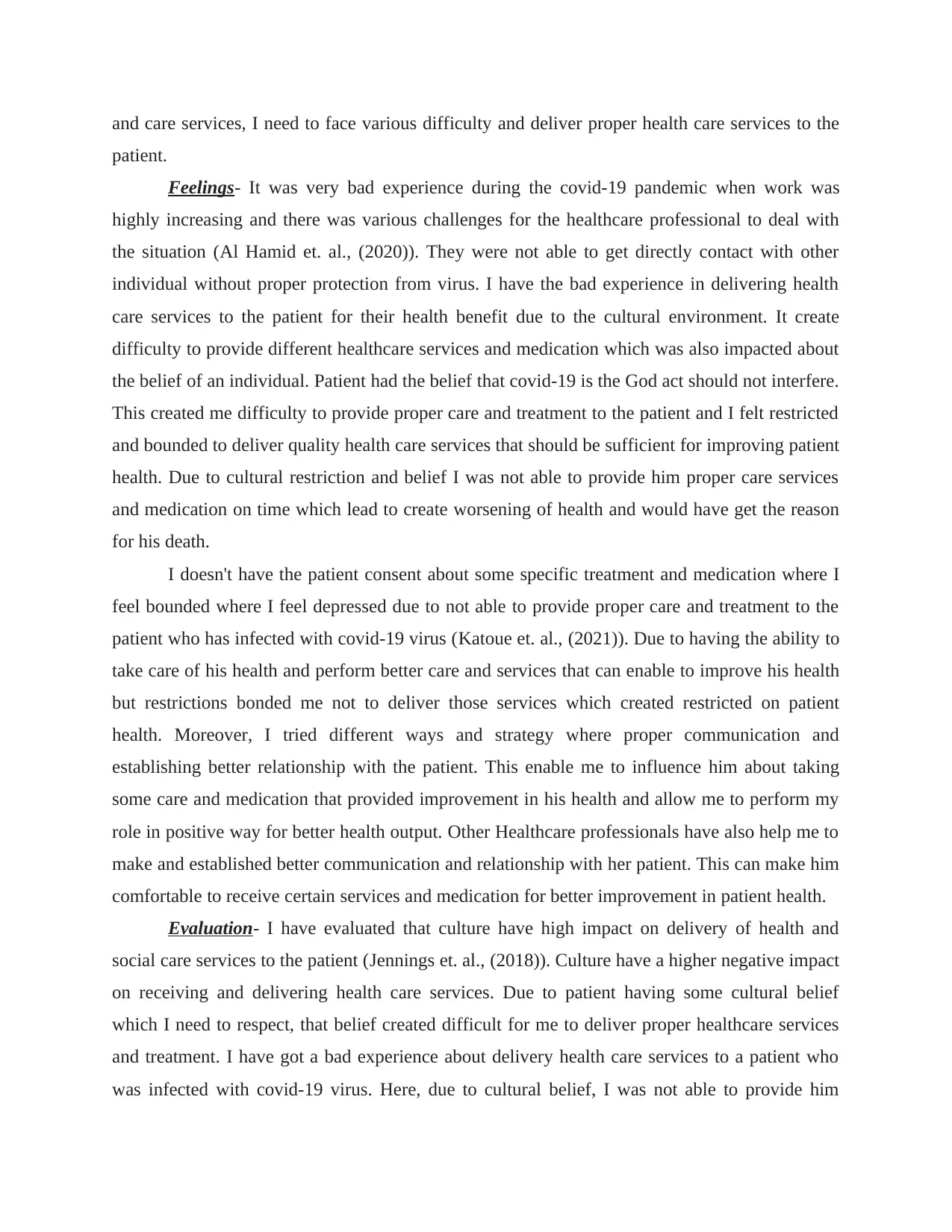
and care services, I need to face various difficulty and deliver proper health care services to the
patient.
Feelings- It was very bad experience during the covid-19 pandemic when work was
highly increasing and there was various challenges for the healthcare professional to deal with
the situation (Al Hamid et. al., (2020)). They were not able to get directly contact with other
individual without proper protection from virus. I have the bad experience in delivering health
care services to the patient for their health benefit due to the cultural environment. It create
difficulty to provide different healthcare services and medication which was also impacted about
the belief of an individual. Patient had the belief that covid-19 is the God act should not interfere.
This created me difficulty to provide proper care and treatment to the patient and I felt restricted
and bounded to deliver quality health care services that should be sufficient for improving patient
health. Due to cultural restriction and belief I was not able to provide him proper care services
and medication on time which lead to create worsening of health and would have get the reason
for his death.
I doesn't have the patient consent about some specific treatment and medication where I
feel bounded where I feel depressed due to not able to provide proper care and treatment to the
patient who has infected with covid-19 virus (Katoue et. al., (2021)). Due to having the ability to
take care of his health and perform better care and services that can enable to improve his health
but restrictions bonded me not to deliver those services which created restricted on patient
health. Moreover, I tried different ways and strategy where proper communication and
establishing better relationship with the patient. This enable me to influence him about taking
some care and medication that provided improvement in his health and allow me to perform my
role in positive way for better health output. Other Healthcare professionals have also help me to
make and established better communication and relationship with her patient. This can make him
comfortable to receive certain services and medication for better improvement in patient health.
Evaluation- I have evaluated that culture have high impact on delivery of health and
social care services to the patient (Jennings et. al., (2018)). Culture have a higher negative impact
on receiving and delivering health care services. Due to patient having some cultural belief
which I need to respect, that belief created difficult for me to deliver proper healthcare services
and treatment. I have got a bad experience about delivery health care services to a patient who
was infected with covid-19 virus. Here, due to cultural belief, I was not able to provide him
patient.
Feelings- It was very bad experience during the covid-19 pandemic when work was
highly increasing and there was various challenges for the healthcare professional to deal with
the situation (Al Hamid et. al., (2020)). They were not able to get directly contact with other
individual without proper protection from virus. I have the bad experience in delivering health
care services to the patient for their health benefit due to the cultural environment. It create
difficulty to provide different healthcare services and medication which was also impacted about
the belief of an individual. Patient had the belief that covid-19 is the God act should not interfere.
This created me difficulty to provide proper care and treatment to the patient and I felt restricted
and bounded to deliver quality health care services that should be sufficient for improving patient
health. Due to cultural restriction and belief I was not able to provide him proper care services
and medication on time which lead to create worsening of health and would have get the reason
for his death.
I doesn't have the patient consent about some specific treatment and medication where I
feel bounded where I feel depressed due to not able to provide proper care and treatment to the
patient who has infected with covid-19 virus (Katoue et. al., (2021)). Due to having the ability to
take care of his health and perform better care and services that can enable to improve his health
but restrictions bonded me not to deliver those services which created restricted on patient
health. Moreover, I tried different ways and strategy where proper communication and
establishing better relationship with the patient. This enable me to influence him about taking
some care and medication that provided improvement in his health and allow me to perform my
role in positive way for better health output. Other Healthcare professionals have also help me to
make and established better communication and relationship with her patient. This can make him
comfortable to receive certain services and medication for better improvement in patient health.
Evaluation- I have evaluated that culture have high impact on delivery of health and
social care services to the patient (Jennings et. al., (2018)). Culture have a higher negative impact
on receiving and delivering health care services. Due to patient having some cultural belief
which I need to respect, that belief created difficult for me to deliver proper healthcare services
and treatment. I have got a bad experience about delivery health care services to a patient who
was infected with covid-19 virus. Here, due to cultural belief, I was not able to provide him
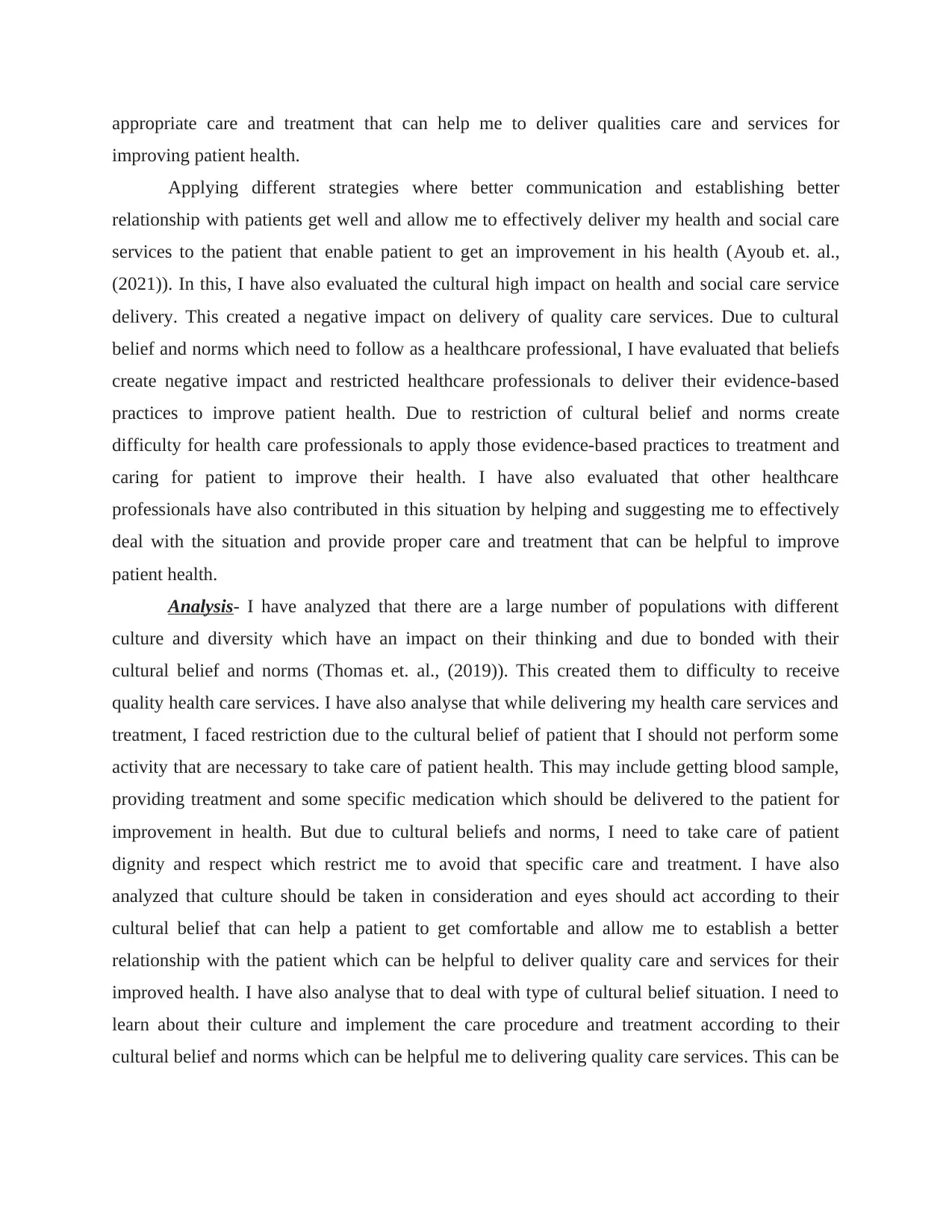
appropriate care and treatment that can help me to deliver qualities care and services for
improving patient health.
Applying different strategies where better communication and establishing better
relationship with patients get well and allow me to effectively deliver my health and social care
services to the patient that enable patient to get an improvement in his health (Ayoub et. al.,
(2021)). In this, I have also evaluated the cultural high impact on health and social care service
delivery. This created a negative impact on delivery of quality care services. Due to cultural
belief and norms which need to follow as a healthcare professional, I have evaluated that beliefs
create negative impact and restricted healthcare professionals to deliver their evidence-based
practices to improve patient health. Due to restriction of cultural belief and norms create
difficulty for health care professionals to apply those evidence-based practices to treatment and
caring for patient to improve their health. I have also evaluated that other healthcare
professionals have also contributed in this situation by helping and suggesting me to effectively
deal with the situation and provide proper care and treatment that can be helpful to improve
patient health.
Analysis- I have analyzed that there are a large number of populations with different
culture and diversity which have an impact on their thinking and due to bonded with their
cultural belief and norms (Thomas et. al., (2019)). This created them to difficulty to receive
quality health care services. I have also analyse that while delivering my health care services and
treatment, I faced restriction due to the cultural belief of patient that I should not perform some
activity that are necessary to take care of patient health. This may include getting blood sample,
providing treatment and some specific medication which should be delivered to the patient for
improvement in health. But due to cultural beliefs and norms, I need to take care of patient
dignity and respect which restrict me to avoid that specific care and treatment. I have also
analyzed that culture should be taken in consideration and eyes should act according to their
cultural belief that can help a patient to get comfortable and allow me to establish a better
relationship with the patient which can be helpful to deliver quality care and services for their
improved health. I have also analyse that to deal with type of cultural belief situation. I need to
learn about their culture and implement the care procedure and treatment according to their
cultural belief and norms which can be helpful me to delivering quality care services. This can be
improving patient health.
Applying different strategies where better communication and establishing better
relationship with patients get well and allow me to effectively deliver my health and social care
services to the patient that enable patient to get an improvement in his health (Ayoub et. al.,
(2021)). In this, I have also evaluated the cultural high impact on health and social care service
delivery. This created a negative impact on delivery of quality care services. Due to cultural
belief and norms which need to follow as a healthcare professional, I have evaluated that beliefs
create negative impact and restricted healthcare professionals to deliver their evidence-based
practices to improve patient health. Due to restriction of cultural belief and norms create
difficulty for health care professionals to apply those evidence-based practices to treatment and
caring for patient to improve their health. I have also evaluated that other healthcare
professionals have also contributed in this situation by helping and suggesting me to effectively
deal with the situation and provide proper care and treatment that can be helpful to improve
patient health.
Analysis- I have analyzed that there are a large number of populations with different
culture and diversity which have an impact on their thinking and due to bonded with their
cultural belief and norms (Thomas et. al., (2019)). This created them to difficulty to receive
quality health care services. I have also analyse that while delivering my health care services and
treatment, I faced restriction due to the cultural belief of patient that I should not perform some
activity that are necessary to take care of patient health. This may include getting blood sample,
providing treatment and some specific medication which should be delivered to the patient for
improvement in health. But due to cultural beliefs and norms, I need to take care of patient
dignity and respect which restrict me to avoid that specific care and treatment. I have also
analyzed that culture should be taken in consideration and eyes should act according to their
cultural belief that can help a patient to get comfortable and allow me to establish a better
relationship with the patient which can be helpful to deliver quality care and services for their
improved health. I have also analyse that to deal with type of cultural belief situation. I need to
learn about their culture and implement the care procedure and treatment according to their
cultural belief and norms which can be helpful me to delivering quality care services. This can be
⊘ This is a preview!⊘
Do you want full access?
Subscribe today to unlock all pages.

Trusted by 1+ million students worldwide
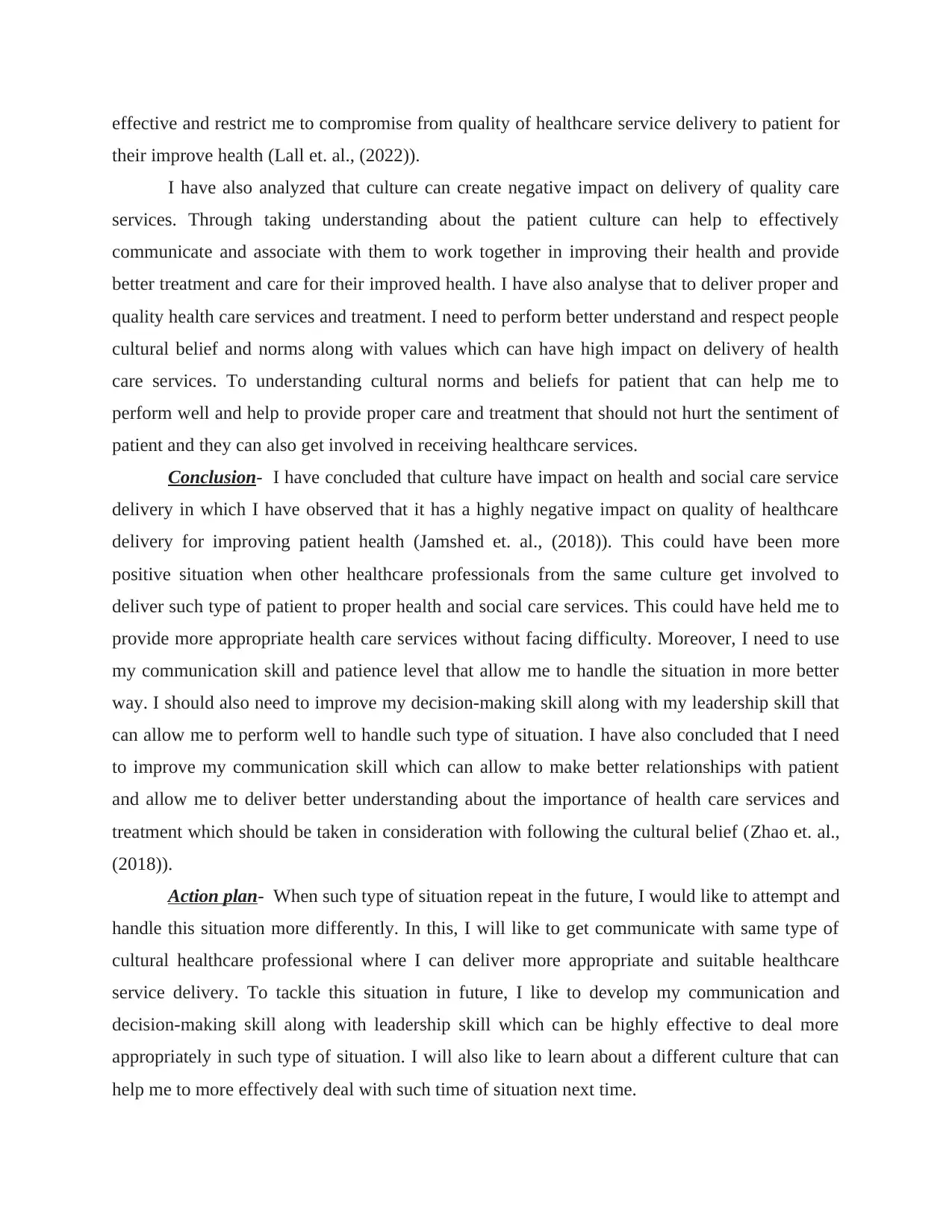
effective and restrict me to compromise from quality of healthcare service delivery to patient for
their improve health (Lall et. al., (2022)).
I have also analyzed that culture can create negative impact on delivery of quality care
services. Through taking understanding about the patient culture can help to effectively
communicate and associate with them to work together in improving their health and provide
better treatment and care for their improved health. I have also analyse that to deliver proper and
quality health care services and treatment. I need to perform better understand and respect people
cultural belief and norms along with values which can have high impact on delivery of health
care services. To understanding cultural norms and beliefs for patient that can help me to
perform well and help to provide proper care and treatment that should not hurt the sentiment of
patient and they can also get involved in receiving healthcare services.
Conclusion- I have concluded that culture have impact on health and social care service
delivery in which I have observed that it has a highly negative impact on quality of healthcare
delivery for improving patient health (Jamshed et. al., (2018)). This could have been more
positive situation when other healthcare professionals from the same culture get involved to
deliver such type of patient to proper health and social care services. This could have held me to
provide more appropriate health care services without facing difficulty. Moreover, I need to use
my communication skill and patience level that allow me to handle the situation in more better
way. I should also need to improve my decision-making skill along with my leadership skill that
can allow me to perform well to handle such type of situation. I have also concluded that I need
to improve my communication skill which can allow to make better relationships with patient
and allow me to deliver better understanding about the importance of health care services and
treatment which should be taken in consideration with following the cultural belief (Zhao et. al.,
(2018)).
Action plan- When such type of situation repeat in the future, I would like to attempt and
handle this situation more differently. In this, I will like to get communicate with same type of
cultural healthcare professional where I can deliver more appropriate and suitable healthcare
service delivery. To tackle this situation in future, I like to develop my communication and
decision-making skill along with leadership skill which can be highly effective to deal more
appropriately in such type of situation. I will also like to learn about a different culture that can
help me to more effectively deal with such time of situation next time.
their improve health (Lall et. al., (2022)).
I have also analyzed that culture can create negative impact on delivery of quality care
services. Through taking understanding about the patient culture can help to effectively
communicate and associate with them to work together in improving their health and provide
better treatment and care for their improved health. I have also analyse that to deliver proper and
quality health care services and treatment. I need to perform better understand and respect people
cultural belief and norms along with values which can have high impact on delivery of health
care services. To understanding cultural norms and beliefs for patient that can help me to
perform well and help to provide proper care and treatment that should not hurt the sentiment of
patient and they can also get involved in receiving healthcare services.
Conclusion- I have concluded that culture have impact on health and social care service
delivery in which I have observed that it has a highly negative impact on quality of healthcare
delivery for improving patient health (Jamshed et. al., (2018)). This could have been more
positive situation when other healthcare professionals from the same culture get involved to
deliver such type of patient to proper health and social care services. This could have held me to
provide more appropriate health care services without facing difficulty. Moreover, I need to use
my communication skill and patience level that allow me to handle the situation in more better
way. I should also need to improve my decision-making skill along with my leadership skill that
can allow me to perform well to handle such type of situation. I have also concluded that I need
to improve my communication skill which can allow to make better relationships with patient
and allow me to deliver better understanding about the importance of health care services and
treatment which should be taken in consideration with following the cultural belief (Zhao et. al.,
(2018)).
Action plan- When such type of situation repeat in the future, I would like to attempt and
handle this situation more differently. In this, I will like to get communicate with same type of
cultural healthcare professional where I can deliver more appropriate and suitable healthcare
service delivery. To tackle this situation in future, I like to develop my communication and
decision-making skill along with leadership skill which can be highly effective to deal more
appropriately in such type of situation. I will also like to learn about a different culture that can
help me to more effectively deal with such time of situation next time.
Paraphrase This Document
Need a fresh take? Get an instant paraphrase of this document with our AI Paraphraser
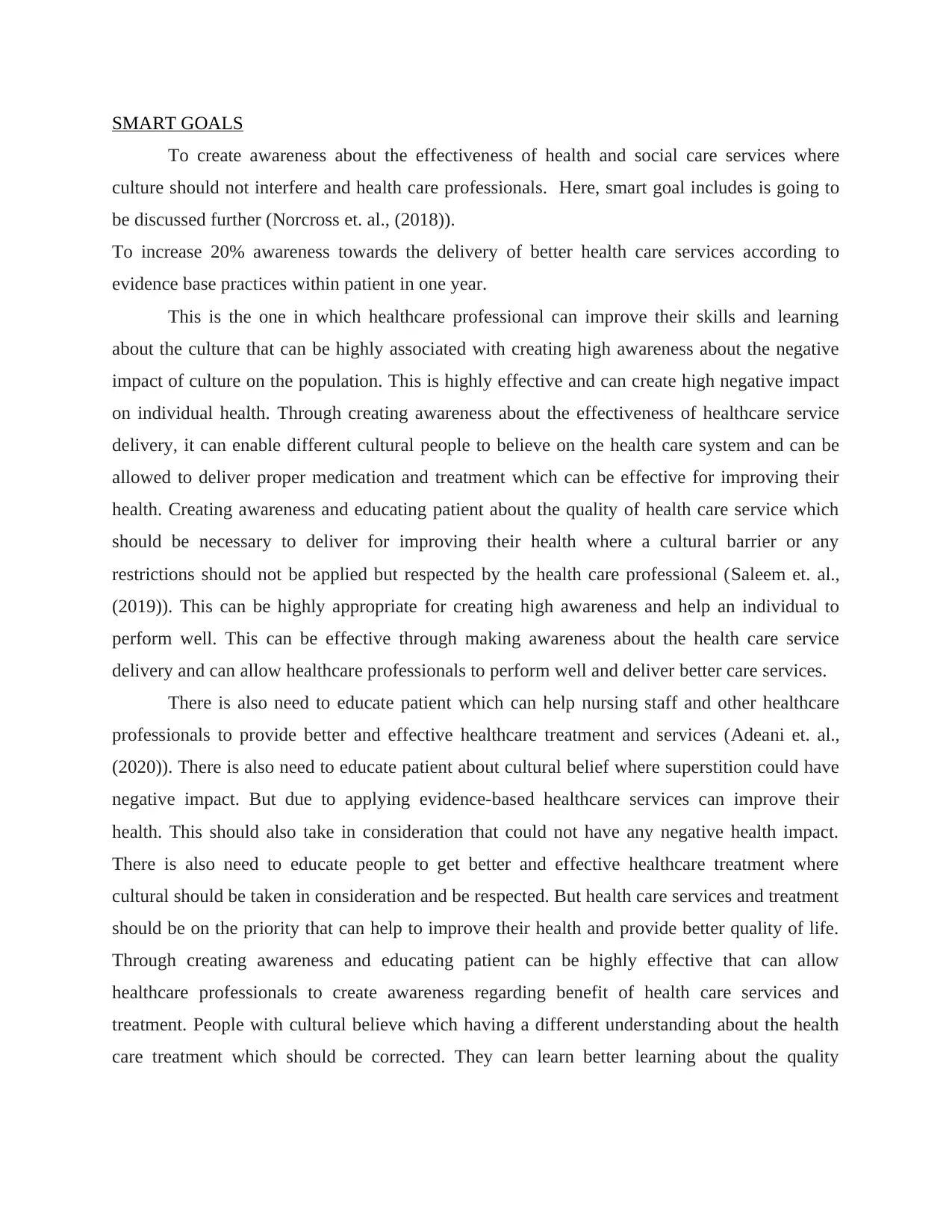
SMART GOALS
To create awareness about the effectiveness of health and social care services where
culture should not interfere and health care professionals. Here, smart goal includes is going to
be discussed further (Norcross et. al., (2018)).
To increase 20% awareness towards the delivery of better health care services according to
evidence base practices within patient in one year.
This is the one in which healthcare professional can improve their skills and learning
about the culture that can be highly associated with creating high awareness about the negative
impact of culture on the population. This is highly effective and can create high negative impact
on individual health. Through creating awareness about the effectiveness of healthcare service
delivery, it can enable different cultural people to believe on the health care system and can be
allowed to deliver proper medication and treatment which can be effective for improving their
health. Creating awareness and educating patient about the quality of health care service which
should be necessary to deliver for improving their health where a cultural barrier or any
restrictions should not be applied but respected by the health care professional (Saleem et. al.,
(2019)). This can be highly appropriate for creating high awareness and help an individual to
perform well. This can be effective through making awareness about the health care service
delivery and can allow healthcare professionals to perform well and deliver better care services.
There is also need to educate patient which can help nursing staff and other healthcare
professionals to provide better and effective healthcare treatment and services (Adeani et. al.,
(2020)). There is also need to educate patient about cultural belief where superstition could have
negative impact. But due to applying evidence-based healthcare services can improve their
health. This should also take in consideration that could not have any negative health impact.
There is also need to educate people to get better and effective healthcare treatment where
cultural should be taken in consideration and be respected. But health care services and treatment
should be on the priority that can help to improve their health and provide better quality of life.
Through creating awareness and educating patient can be highly effective that can allow
healthcare professionals to create awareness regarding benefit of health care services and
treatment. People with cultural believe which having a different understanding about the health
care treatment which should be corrected. They can learn better learning about the quality
To create awareness about the effectiveness of health and social care services where
culture should not interfere and health care professionals. Here, smart goal includes is going to
be discussed further (Norcross et. al., (2018)).
To increase 20% awareness towards the delivery of better health care services according to
evidence base practices within patient in one year.
This is the one in which healthcare professional can improve their skills and learning
about the culture that can be highly associated with creating high awareness about the negative
impact of culture on the population. This is highly effective and can create high negative impact
on individual health. Through creating awareness about the effectiveness of healthcare service
delivery, it can enable different cultural people to believe on the health care system and can be
allowed to deliver proper medication and treatment which can be effective for improving their
health. Creating awareness and educating patient about the quality of health care service which
should be necessary to deliver for improving their health where a cultural barrier or any
restrictions should not be applied but respected by the health care professional (Saleem et. al.,
(2019)). This can be highly appropriate for creating high awareness and help an individual to
perform well. This can be effective through making awareness about the health care service
delivery and can allow healthcare professionals to perform well and deliver better care services.
There is also need to educate patient which can help nursing staff and other healthcare
professionals to provide better and effective healthcare treatment and services (Adeani et. al.,
(2020)). There is also need to educate patient about cultural belief where superstition could have
negative impact. But due to applying evidence-based healthcare services can improve their
health. This should also take in consideration that could not have any negative health impact.
There is also need to educate people to get better and effective healthcare treatment where
cultural should be taken in consideration and be respected. But health care services and treatment
should be on the priority that can help to improve their health and provide better quality of life.
Through creating awareness and educating patient can be highly effective that can allow
healthcare professionals to create awareness regarding benefit of health care services and
treatment. People with cultural believe which having a different understanding about the health
care treatment which should be corrected. They can learn better learning about the quality
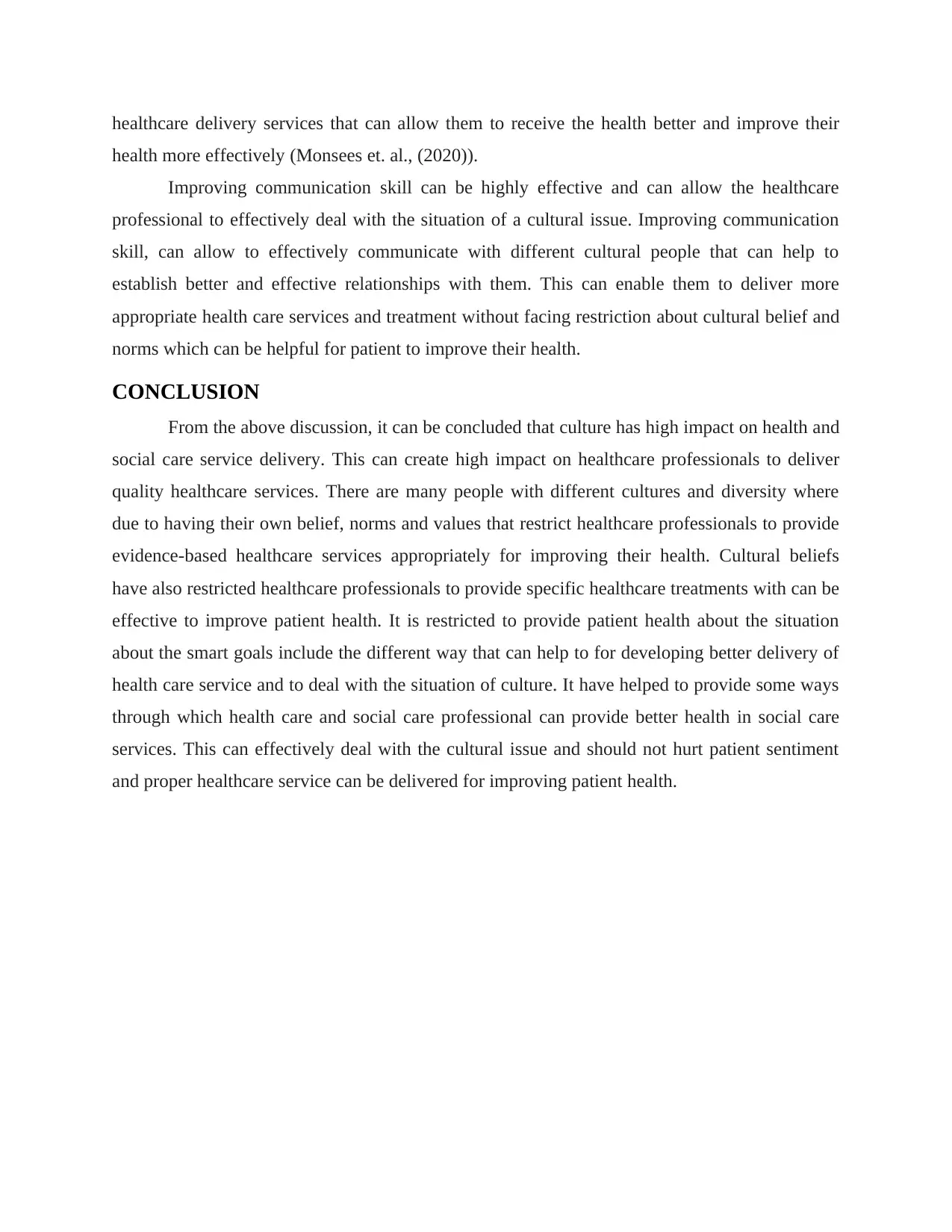
healthcare delivery services that can allow them to receive the health better and improve their
health more effectively (Monsees et. al., (2020)).
Improving communication skill can be highly effective and can allow the healthcare
professional to effectively deal with the situation of a cultural issue. Improving communication
skill, can allow to effectively communicate with different cultural people that can help to
establish better and effective relationships with them. This can enable them to deliver more
appropriate health care services and treatment without facing restriction about cultural belief and
norms which can be helpful for patient to improve their health.
CONCLUSION
From the above discussion, it can be concluded that culture has high impact on health and
social care service delivery. This can create high impact on healthcare professionals to deliver
quality healthcare services. There are many people with different cultures and diversity where
due to having their own belief, norms and values that restrict healthcare professionals to provide
evidence-based healthcare services appropriately for improving their health. Cultural beliefs
have also restricted healthcare professionals to provide specific healthcare treatments with can be
effective to improve patient health. It is restricted to provide patient health about the situation
about the smart goals include the different way that can help to for developing better delivery of
health care service and to deal with the situation of culture. It have helped to provide some ways
through which health care and social care professional can provide better health in social care
services. This can effectively deal with the cultural issue and should not hurt patient sentiment
and proper healthcare service can be delivered for improving patient health.
health more effectively (Monsees et. al., (2020)).
Improving communication skill can be highly effective and can allow the healthcare
professional to effectively deal with the situation of a cultural issue. Improving communication
skill, can allow to effectively communicate with different cultural people that can help to
establish better and effective relationships with them. This can enable them to deliver more
appropriate health care services and treatment without facing restriction about cultural belief and
norms which can be helpful for patient to improve their health.
CONCLUSION
From the above discussion, it can be concluded that culture has high impact on health and
social care service delivery. This can create high impact on healthcare professionals to deliver
quality healthcare services. There are many people with different cultures and diversity where
due to having their own belief, norms and values that restrict healthcare professionals to provide
evidence-based healthcare services appropriately for improving their health. Cultural beliefs
have also restricted healthcare professionals to provide specific healthcare treatments with can be
effective to improve patient health. It is restricted to provide patient health about the situation
about the smart goals include the different way that can help to for developing better delivery of
health care service and to deal with the situation of culture. It have helped to provide some ways
through which health care and social care professional can provide better health in social care
services. This can effectively deal with the cultural issue and should not hurt patient sentiment
and proper healthcare service can be delivered for improving patient health.
⊘ This is a preview!⊘
Do you want full access?
Subscribe today to unlock all pages.

Trusted by 1+ million students worldwide
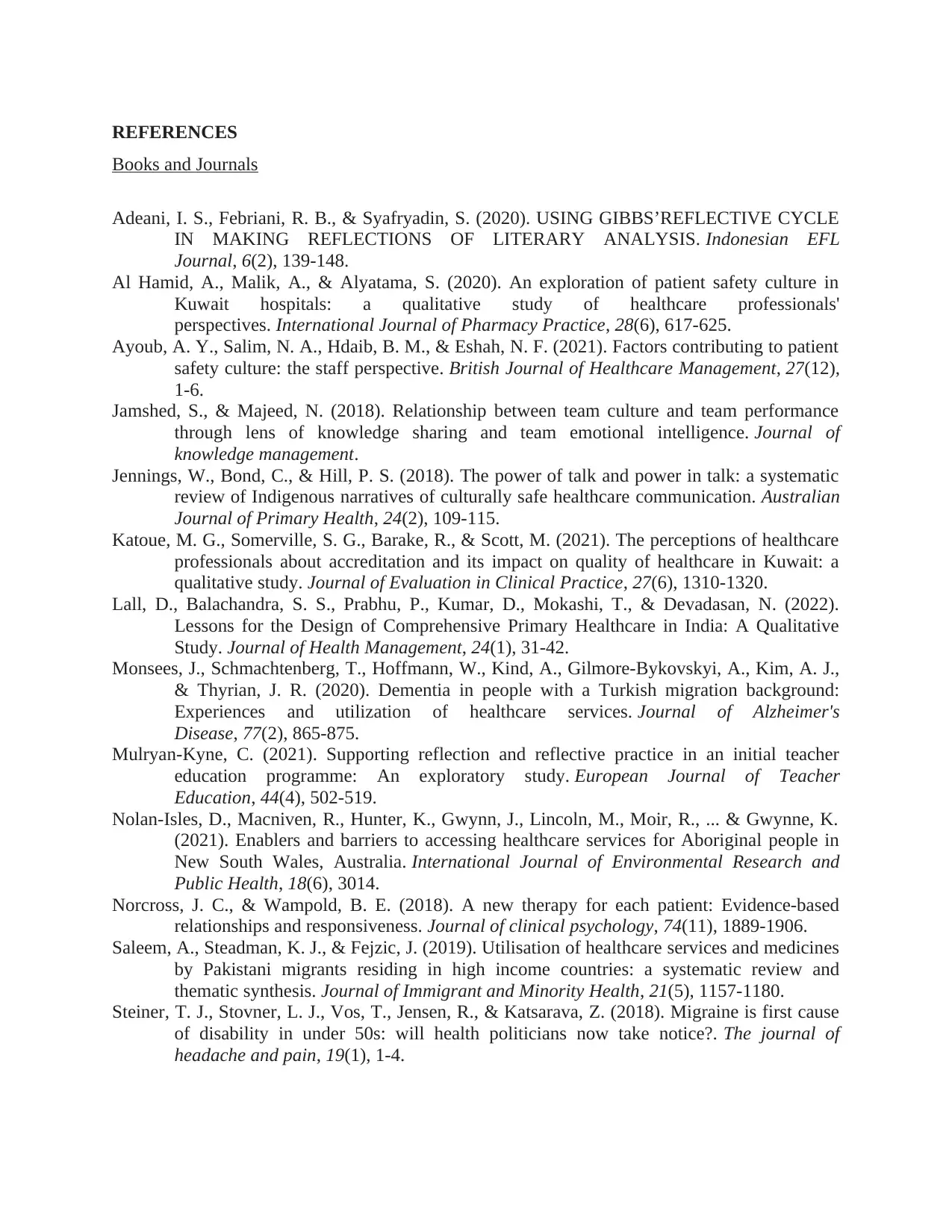
REFERENCES
Books and Journals
Adeani, I. S., Febriani, R. B., & Syafryadin, S. (2020). USING GIBBS’REFLECTIVE CYCLE
IN MAKING REFLECTIONS OF LITERARY ANALYSIS. Indonesian EFL
Journal, 6(2), 139-148.
Al Hamid, A., Malik, A., & Alyatama, S. (2020). An exploration of patient safety culture in
Kuwait hospitals: a qualitative study of healthcare professionals'
perspectives. International Journal of Pharmacy Practice, 28(6), 617-625.
Ayoub, A. Y., Salim, N. A., Hdaib, B. M., & Eshah, N. F. (2021). Factors contributing to patient
safety culture: the staff perspective. British Journal of Healthcare Management, 27(12),
1-6.
Jamshed, S., & Majeed, N. (2018). Relationship between team culture and team performance
through lens of knowledge sharing and team emotional intelligence. Journal of
knowledge management.
Jennings, W., Bond, C., & Hill, P. S. (2018). The power of talk and power in talk: a systematic
review of Indigenous narratives of culturally safe healthcare communication. Australian
Journal of Primary Health, 24(2), 109-115.
Katoue, M. G., Somerville, S. G., Barake, R., & Scott, M. (2021). The perceptions of healthcare
professionals about accreditation and its impact on quality of healthcare in Kuwait: a
qualitative study. Journal of Evaluation in Clinical Practice, 27(6), 1310-1320.
Lall, D., Balachandra, S. S., Prabhu, P., Kumar, D., Mokashi, T., & Devadasan, N. (2022).
Lessons for the Design of Comprehensive Primary Healthcare in India: A Qualitative
Study. Journal of Health Management, 24(1), 31-42.
Monsees, J., Schmachtenberg, T., Hoffmann, W., Kind, A., Gilmore-Bykovskyi, A., Kim, A. J.,
& Thyrian, J. R. (2020). Dementia in people with a Turkish migration background:
Experiences and utilization of healthcare services. Journal of Alzheimer's
Disease, 77(2), 865-875.
Mulryan-Kyne, C. (2021). Supporting reflection and reflective practice in an initial teacher
education programme: An exploratory study. European Journal of Teacher
Education, 44(4), 502-519.
Nolan-Isles, D., Macniven, R., Hunter, K., Gwynn, J., Lincoln, M., Moir, R., ... & Gwynne, K.
(2021). Enablers and barriers to accessing healthcare services for Aboriginal people in
New South Wales, Australia. International Journal of Environmental Research and
Public Health, 18(6), 3014.
Norcross, J. C., & Wampold, B. E. (2018). A new therapy for each patient: Evidence‐based
relationships and responsiveness. Journal of clinical psychology, 74(11), 1889-1906.
Saleem, A., Steadman, K. J., & Fejzic, J. (2019). Utilisation of healthcare services and medicines
by Pakistani migrants residing in high income countries: a systematic review and
thematic synthesis. Journal of Immigrant and Minority Health, 21(5), 1157-1180.
Steiner, T. J., Stovner, L. J., Vos, T., Jensen, R., & Katsarava, Z. (2018). Migraine is first cause
of disability in under 50s: will health politicians now take notice?. The journal of
headache and pain, 19(1), 1-4.
Books and Journals
Adeani, I. S., Febriani, R. B., & Syafryadin, S. (2020). USING GIBBS’REFLECTIVE CYCLE
IN MAKING REFLECTIONS OF LITERARY ANALYSIS. Indonesian EFL
Journal, 6(2), 139-148.
Al Hamid, A., Malik, A., & Alyatama, S. (2020). An exploration of patient safety culture in
Kuwait hospitals: a qualitative study of healthcare professionals'
perspectives. International Journal of Pharmacy Practice, 28(6), 617-625.
Ayoub, A. Y., Salim, N. A., Hdaib, B. M., & Eshah, N. F. (2021). Factors contributing to patient
safety culture: the staff perspective. British Journal of Healthcare Management, 27(12),
1-6.
Jamshed, S., & Majeed, N. (2018). Relationship between team culture and team performance
through lens of knowledge sharing and team emotional intelligence. Journal of
knowledge management.
Jennings, W., Bond, C., & Hill, P. S. (2018). The power of talk and power in talk: a systematic
review of Indigenous narratives of culturally safe healthcare communication. Australian
Journal of Primary Health, 24(2), 109-115.
Katoue, M. G., Somerville, S. G., Barake, R., & Scott, M. (2021). The perceptions of healthcare
professionals about accreditation and its impact on quality of healthcare in Kuwait: a
qualitative study. Journal of Evaluation in Clinical Practice, 27(6), 1310-1320.
Lall, D., Balachandra, S. S., Prabhu, P., Kumar, D., Mokashi, T., & Devadasan, N. (2022).
Lessons for the Design of Comprehensive Primary Healthcare in India: A Qualitative
Study. Journal of Health Management, 24(1), 31-42.
Monsees, J., Schmachtenberg, T., Hoffmann, W., Kind, A., Gilmore-Bykovskyi, A., Kim, A. J.,
& Thyrian, J. R. (2020). Dementia in people with a Turkish migration background:
Experiences and utilization of healthcare services. Journal of Alzheimer's
Disease, 77(2), 865-875.
Mulryan-Kyne, C. (2021). Supporting reflection and reflective practice in an initial teacher
education programme: An exploratory study. European Journal of Teacher
Education, 44(4), 502-519.
Nolan-Isles, D., Macniven, R., Hunter, K., Gwynn, J., Lincoln, M., Moir, R., ... & Gwynne, K.
(2021). Enablers and barriers to accessing healthcare services for Aboriginal people in
New South Wales, Australia. International Journal of Environmental Research and
Public Health, 18(6), 3014.
Norcross, J. C., & Wampold, B. E. (2018). A new therapy for each patient: Evidence‐based
relationships and responsiveness. Journal of clinical psychology, 74(11), 1889-1906.
Saleem, A., Steadman, K. J., & Fejzic, J. (2019). Utilisation of healthcare services and medicines
by Pakistani migrants residing in high income countries: a systematic review and
thematic synthesis. Journal of Immigrant and Minority Health, 21(5), 1157-1180.
Steiner, T. J., Stovner, L. J., Vos, T., Jensen, R., & Katsarava, Z. (2018). Migraine is first cause
of disability in under 50s: will health politicians now take notice?. The journal of
headache and pain, 19(1), 1-4.
Paraphrase This Document
Need a fresh take? Get an instant paraphrase of this document with our AI Paraphraser
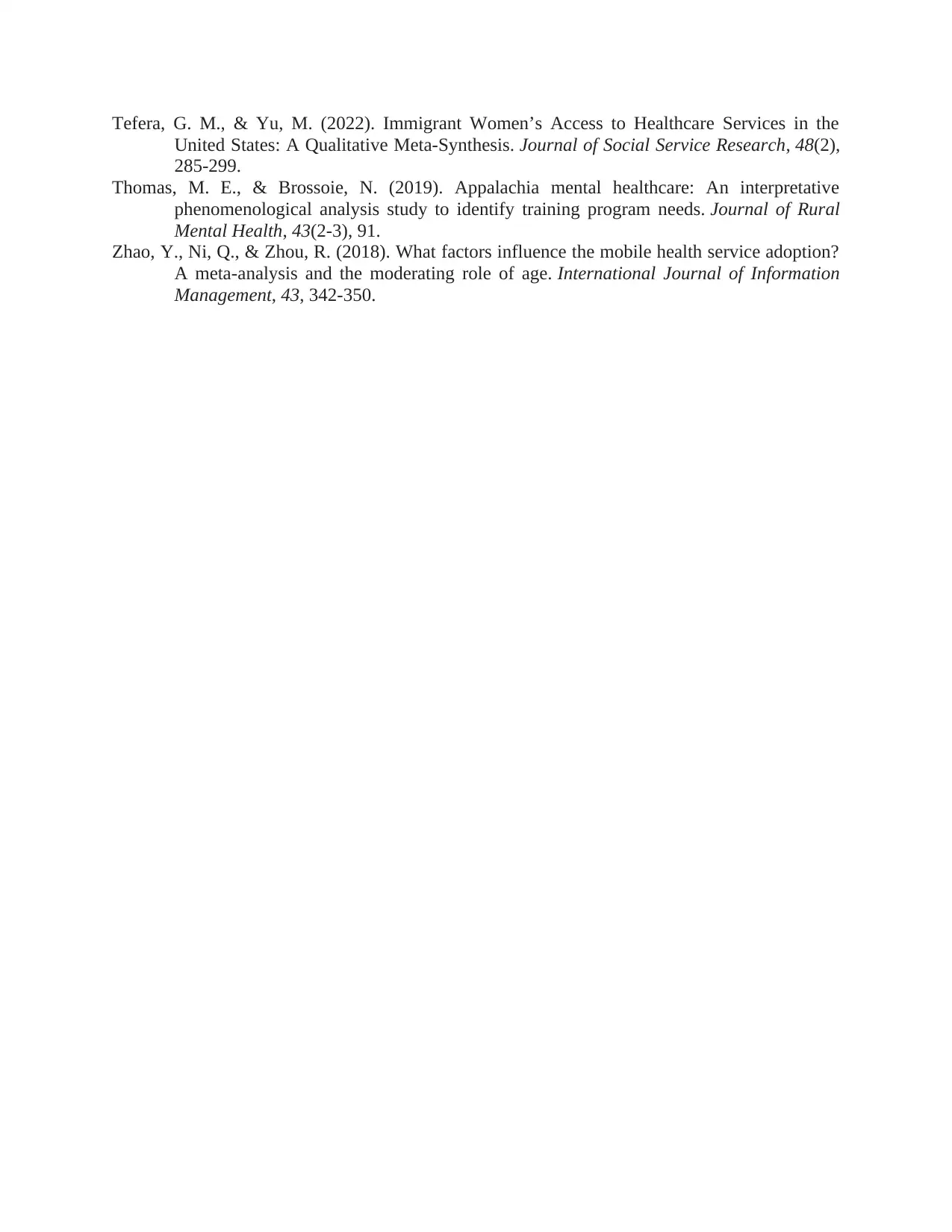
Tefera, G. M., & Yu, M. (2022). Immigrant Women’s Access to Healthcare Services in the
United States: A Qualitative Meta-Synthesis. Journal of Social Service Research, 48(2),
285-299.
Thomas, M. E., & Brossoie, N. (2019). Appalachia mental healthcare: An interpretative
phenomenological analysis study to identify training program needs. Journal of Rural
Mental Health, 43(2-3), 91.
Zhao, Y., Ni, Q., & Zhou, R. (2018). What factors influence the mobile health service adoption?
A meta-analysis and the moderating role of age. International Journal of Information
Management, 43, 342-350.
United States: A Qualitative Meta-Synthesis. Journal of Social Service Research, 48(2),
285-299.
Thomas, M. E., & Brossoie, N. (2019). Appalachia mental healthcare: An interpretative
phenomenological analysis study to identify training program needs. Journal of Rural
Mental Health, 43(2-3), 91.
Zhao, Y., Ni, Q., & Zhou, R. (2018). What factors influence the mobile health service adoption?
A meta-analysis and the moderating role of age. International Journal of Information
Management, 43, 342-350.
1 out of 11
Related Documents
Your All-in-One AI-Powered Toolkit for Academic Success.
+13062052269
info@desklib.com
Available 24*7 on WhatsApp / Email
![[object Object]](/_next/static/media/star-bottom.7253800d.svg)
Unlock your academic potential
Copyright © 2020–2026 A2Z Services. All Rights Reserved. Developed and managed by ZUCOL.




